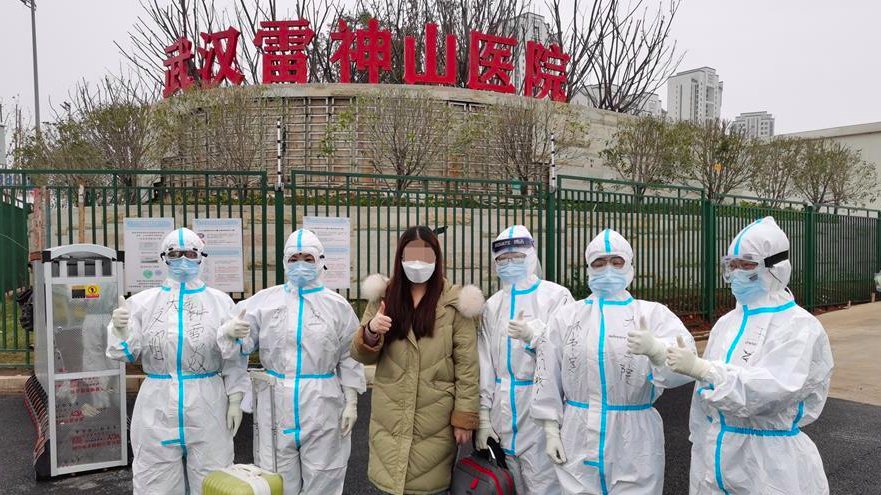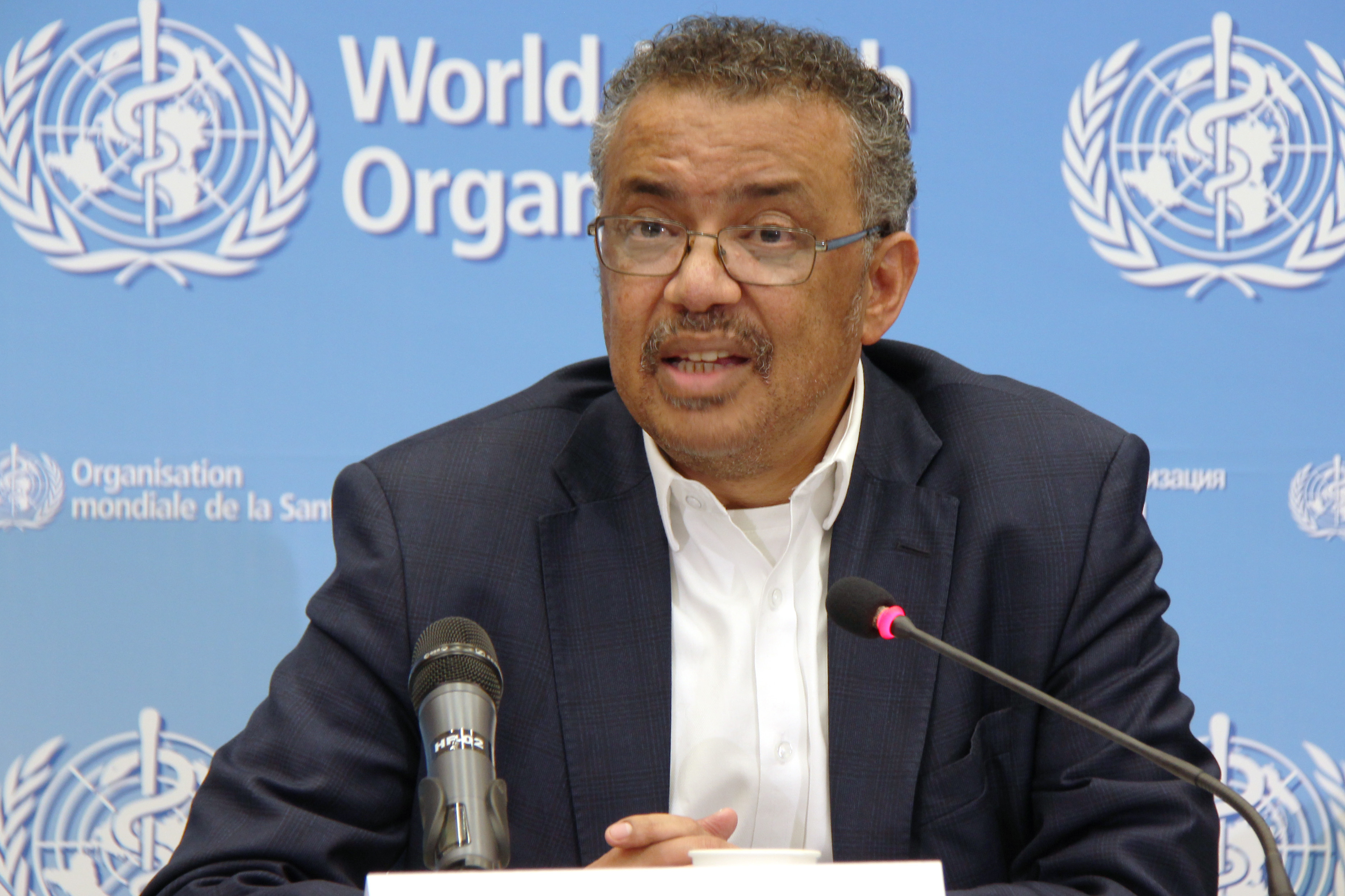
A cured patient poses with medical workers at Leishenshan Hospital in Wuhan, central China's Hubei Province, February 27, 2020. /Xinhua
A cured patient poses with medical workers at Leishenshan Hospital in Wuhan, central China's Hubei Province, February 27, 2020. /Xinhua
Editor's note: Azhar Azam works in a private organization as a business and market analyst and writes about geopolitical issues and regional conflicts. The article reflects the author's opinions, and not necessarily the views of CGTN.
The coronavirus epidemic that has killed more than 3,000 people mostly in China's city of Wuhan, infected over 90,000 and reached more than 64 countries, has been tackled strongly by the Chinese authorities who are gradually gaining control of the flu-like virus. Other than in Hubei Province, the mortality rate of the virus is mostly below one percent with some seven provinces and regions not reporting a single death.
News that one of the 16 specially-built hospitals will close – following a sharp fall in new cases in Hubei Province and its capital Wuhan, which is the epicenter of the disease – established that China is making progress in its well-fought battle against COVID-19. The bold decision was taken after the hospital discharged its last recovered patients.
As China fights the COVID-19 outbreak, there has been widespread criticism, especially in the U.S., about so-called China's violation of human rights through the implementation of a mandatory 14-day quarantine, roadblocks, checkpoints and other lockdown measures.
But with confirmation from the World Health Organization (WHO) and even the U.S. Centers for Disease Control and Prevention (CDC) that people can catch the infection from each other, this vilification has lost its legitimacy and proved that China, through such preventive measures, protected the health, lives and human rights of millions of other of people who were at the risk of falling victim to the disease.
The denigration also lacked legitimacy because the restrictions are of course temporary and will be lifted once normalcy prevails in the country. In addition, the curbs should worry China more than outsiders since the coronavirus has suspended its economic activities and disrupted the routine life of ordinary Chinese people.
In actual fact, China isn't the only country that has quarantined people to prevent the outbreak from inflating. During the 2003 SARS outbreak, Canada too practiced a "community quarantine" that successfully reduced transmission of the disease by one third. The U.S. and Singapore also isolated or quarantined people with suspected or probable cases of SARS in their homes and in hospitals.
After Ebola spiraled out of control in 2014, West African nations agreed to impose a cross-border isolation zone, a "cordon sanitaire," after the WHO warned the outbreak could cause "catastrophic" loss of life and serve economic disruption if it continued to spread. The CDC again found that the separation of sick people and comprehensive contact tracing were the essential components of the Ebola response in Liberia.

Tedros Adhanom Ghebreyesus, director-general of the World Health Organization (WHO), has praised China's efforts in combating COVID-19 on multiple occasions. /Xinhua
Tedros Adhanom Ghebreyesus, director-general of the World Health Organization (WHO), has praised China's efforts in combating COVID-19 on multiple occasions. /Xinhua
The claims that China is gaining effective control of the epidemic are backed by the World Health Organization. In its report, the WHO suggested that the world should follow China's lead, in which the detection of a cluster of pneumonia cases of unknown cause in Wuhan resulted in the launch of a national emergency response.
Explaining the declining COVID-19 cases in China, WHO Assistant Director-General and veteran epidemiologist Bruce Aylward snubbed the Western denunciation saying that the measures China took to fight the outbreak were all common to prevent the spread of disease. He also came down on the side of the lockdowns – decrying human rights violations – and revealed that only people in Wuhan and two or three other cities were confined and lauded Chinese efforts to protect its country and the rest of the world.
The comments coincide with agency's chief Tedros Adhanom Ghebreyesus' remarks that almost eight times as many cases had been reported outside China as inside in the previous 24 hours. So as of now, the world needs China more because of its rigorous knowledge and experience in combating COVID-19.
It is bluntly clear that China has no intention of limiting the human rights of its people; indeed it shielded humans themselves from the fatal consequences of the illness. This is why hopes for the restoration of routine life and economic activities are growing in the country as China witnesses a declining trend in new virus cases.
On March 3, Apple's supplier Foxconn announced it would resume normal production in China by the end of March. While more than half of its workers had already restarted work in the country, the decision by the world's number one contract manufacturer to restart fully-fledged manufacturing in China was an expression of unprecedented belief in the Chinese government's ability to knock out the virus and revive its economy.
China acknowledges that the coronavirus outbreak had a "negative impact" on its economy. Nevertheless, Beijing is committed to bouncing back with the assurance of revitalizing the economy and achieving its economic and social goals for 2020. Over the years, China has faced similar outbursts that threatened its economy and culture.
This time again, China is determined to emerge successfully on the back of its stronger resilience, enormous domestic consumption in the world's biggest market, and the solid foundation of its economic and trade structure. In the past, China has demonstrated that it can do wonders after being struck down and there is no reason it can't do this again.
As China has its system primed for rapid detection and quick response, and its 30 other provinces managed not just to avoid but to reverse the outbreak, it is about time that the people of China should oust any fears and emerge with a stronger will to put the nation and the world on the path of development again.
(If you want to contribute and have specific expertise, please contact us at opinions@cgtn.com.)